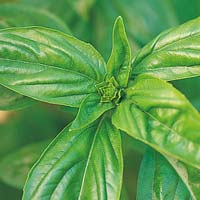Gluten Free
What does following a gluten-free diet mean? That you're embarking on an easy diet with a wide range of health-promoting effects. Instead of dwelling on what you’re giving up, consider that you’re going to enjoy a whole new world of delicious food options to meet your special dietary needs. You’ll be eating seasonally, choosing more fresh fruits and vegetables, focusing on meats, seafood, poultry, legumes, lentils, corn, and rice, and discovering fascinating ancient grains such as quinoa, amaranth, and millet. You’ll be able to eat potatoes, eggs, most cheeses, even chocolate (!)—and enjoy them without guilt because you’ll be taking good care of your body. In fact, you’ll probably end up eating—and feeling—better than ever!
Visit this page for more information about living Gluten Free
---
We carry a large variety of gluten free items, the brands listed below represent just some of the offerings we carry















More Diets
Basil
 © Martin Wall
© Martin WallParts Used & Where Grown
The leaves of basil and its many close relatives are used as medicine. The seeds are also used medicinally in India and Southeast Asia. Though it originates on the shores of the Mediterranean Sea and the Middle East, common basil now grows in gardens all over the world. Three important relatives with similar properties are Ocimum canum (hairy basil), O. gratissimum (basil), and O. sanctum (holy basil).
- Reliable and relatively consistent scientific data showing a substantial health benefit.
- Contradictory, insufficient, or preliminary studies suggesting a health benefit or minimal health benefit.
- For an herb, supported by traditional use but minimal or no scientific evidence. For a supplement, little scientific support.
Our proprietary “Star-Rating” system was developed to help you easily understand the amount of scientific support behind each supplement in relation to a specific health condition. While there is no way to predict whether a vitamin, mineral, or herb will successfully treat or prevent associated health conditions, our unique ratings tell you how well these supplements are understood by the medical community, and whether studies have found them to be effective for other people.
For over a decade, our team has combed through thousands of research articles published in reputable journals. To help you make educated decisions, and to better understand controversial or confusing supplements, our medical experts have digested the science into these three easy-to-follow ratings. We hope this provides you with a helpful resource to make informed decisions towards your health and well-being.
This supplement has been used in connection with the following health conditions:
| Used for | Amount | Why |
|---|---|---|
Constipation | Take as tea (2 tsp in 2 cups of water), or as a tincture or capsules (follow label instructions) | Basil seed has been found to relieve constipation by acting as a bulk-forming laxative in one preliminary study. |
Indigestion, Heartburn, and Low Stomach Acidity | Refer to label instructions | Basil is a gas-relieving herb that may be helpful in calming an upset stomach. |
Traditional Use (May Not Be Supported by Scientific Studies)
Basil has been a culinary herb in Europe and Central Asia since before the written word.1 In India the seeds were used for diarrhea, mucous discharges, constipation, and as a general demulcent (soothes mucous membranes);2 the leaves were used for indigestion and skin diseases. In traditional Thai herbalism, the plant is used for coughs, skin diseases, and intestinal problems. The seed is used as a bulk-forming laxative and diuretic.3
Copyright © 2025 TraceGains, Inc. All rights reserved.
Learn more about TraceGains, the company.
The information presented by TraceGains is for informational purposes only. It is based on scientific studies (human, animal, or in vitro), clinical experience, or traditional usage as cited in each article. The results reported may not necessarily occur in all individuals. Self-treatment is not recommended for life-threatening conditions that require medical treatment under a doctor's care. For many of the conditions discussed, treatment with prescription or over the counter medication is also available. Consult your doctor, practitioner, and/or pharmacist for any health problem and before using any supplements or before making any changes in prescribed medications. Information expires December 2025.











